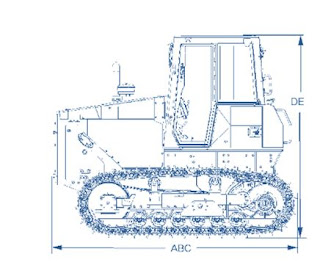Service Preventive Maintenance D7G and D7G Series II Track-Type Tractors

Intended Usage
According to "ISO 6165:2001," this machine is a Track-Type Tractor,
which is an earthmoving equipment. The machine is self-powered and equipped with equipment that employs a dozer blade in forward motion to accomplish the following functions: cutting, moving, and grading. This equipment may employ a mounted attachment, such as a ripper or a towing winch, to execute a push-pull operation. Other applications include pushing scrapers during loading and drawing towing equipment while the drawbar is in operation.Machine Data
The basic machine specifications for the D7G XL Series II Track-Type Tractor are listed below
|
D7G XL Track-Type Tractor
|
|
|
Shipping Weight (1)
|
20161 kg (44448 lb) |
|
Operating Weight (2)
|
20544 kg (45292 lb) |
|
Operating Weight with Ripper (three tooth)
|
23434 kg (51663 lb) |
|
Length of Machine (A) |
4330 mm (14.2 ft) |
|
Length of Machine with SU Bulldozer blade (B)
|
5484 mm (17.9 ft) |
|
Length of Machine with SU Bulldozer blade and Ripper (C)
|
7011 mm (23.0 ft) |
|
Width of Machine across Tracks |
2540 mm (8.3 ft) |
|
Height of Machine with OROPS (D)
|
3367 mm (11.0 ft) |
|
Height of Machine with EROPS (E)
|
3367 mm (11.0 ft) |
Maintenance Interval Schedule
Before performing any operating or maintenance operations, ensure that all safety information, warnings, and directions are read and understood.
Maintenance is the user's responsibility, including any adjustments, the use of suitable lubricants, fluids, and filters, and the replacement of components owing to normal wear and age. Failure to follow correct maintenance intervals and procedures may result in decreased product performance and/or accelerated component wear.
Use mileage, fuel consumption, service hours, or calendar time, WHICH EVER OCCURS FIRST, in order to determine the maintenance intervals. Products that operate in severe operating conditions may require more frequent maintenance.
Note: Before each consecutive interval is performed, all maintenance from the previous interval must be performed.
When Required
- Battery - Recycle
- Battery, Battery Cable or Battery Disconnect Switch - Replace
- Condenser (Refrigerant) - Clean
- Cutting Edges and End Bits - Inspect/Replace
- Engine Air Filter Primary Element - Clean/Replace
- Engine Air Filter Secondary Element - Replace
- Engine Air Precleaner - Clean
- Ether Starting Aid Cylinder - Replace
- Fuel System - Prime
- Fuses and Circuit Breakers - Replace/Reset
- Oil Filter - Inspect
- Radiator Core - Clean
- Radiator Pressure Cap - Clean/Replace
- Ripper Tip and Shank Protector - Inspect/Replace
- Window Washer Reservoir - Fill
- Window Wipers - Inspect/Replace
- Windows - Clean
Every 10 Service Hours or Daily
- Backup Alarm - Test
- Brakes, Indicators and Gauges - Test
- Cooling System Coolant Level - Check
- Engine Oil Level - Check
- Fuel System Primary Filter (Water Separator) - Drain
- Fuel Tank Water and Sediment - Drain
- Horn - Test
- Hydraulic System Oil Level - Check
- Seat Belt - Inspect
- Transmission Oil Level - Check
Every 50 Service Hours or Weekly
- Bulldozer Cylinder Support Bearings - Lubricate
- Ripper Linkage and Cylinder Bearings - Lubricate
- Sprocket Hub Bearings - Inspect
- Track Pins - Inspect
- Track Roller Frame Bearings - Lubricate
Every 100 Service Hours or 2 Weeks
- Hydraulic Control Linkage - Lubricate
Every 250 Service Hours or Monthly
- Belts - Inspect/Adjust/Replace
- Bulldozer Tilt Brace - Lubricate
- Fan Drive Bearing - Lubricate
- Final Drive Oil Level - Check
- Track - Check/Adjust
Every 250 Service Hours or 3 Months
- Engine Oil and Filter - Change
Initial 500 Hours (for New Systems, Refilled Systems, and Converted Systems)
- Cooling System Coolant Sample (Level 2) - Obtain
Every 500 Service Hours
- Cooling System Coolant Sample (Level 1) - Obtain
- Final Drive Oil Sample - Obtain
- Transmission Oil Sample - Obtain
Every 500 Service Hours or 3 Months
- Engine Crankcase Breather - Clean
- Equalizer Bar Pads - Inspect/Replace
- Fuel System Primary Filter - Clean/Replace
- Fuel System Secondary Filter - Replace
- Fuel Tank Cap and Strainer - Clean
- Hydraulic System Oil Filter - Replace
- Hydraulic System Oil Sample - Obtain
- Sprocket Hub Bearings - Inspect
- Transmission Oil Filter - Replace
Every 1000 Service Hours
- Battery - Inspect
Every 1000 Service Hours or 6 Months
- Transmission Magnetic Screen - Clean
- Transmission Oil - Change
Every 2000 Service Hours or 1 Year
- Engine Valve Lash - Check
- Engine Valve Rotators - Inspect
- Final Drive Oil - Change
- Hydraulic System Oil - Change
- Sprocket Hub Bearings - Adjust
Every Year
- Cooling System Coolant Sample (Level 2) - Obtain
Every 3 Years After Date of Installation or Every 5 Years After Date of Manufacture
- Seat Belt - Replace
Every 4000 Service Hours or 2 Years
- Cooling System Water Temperature Regulator - Clean/Replace
Every 6000 Service Hours or 3 Years
- Cooling System Coolant Extender (ELC) - Add
Every 12 000 Service Hours or 6 Years
- Cooling System Coolant (ELC) - Change
Yuk kepoin tips dan trik KelasMekanik lainnya di Google news








